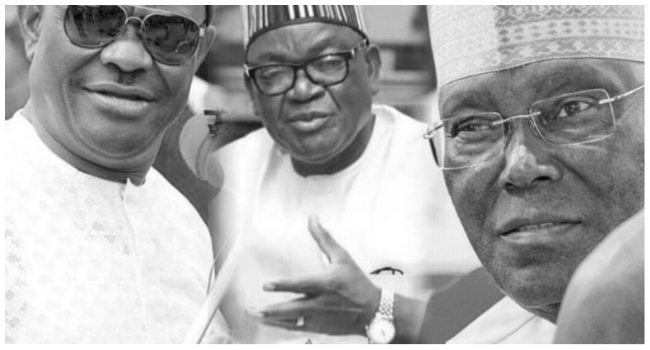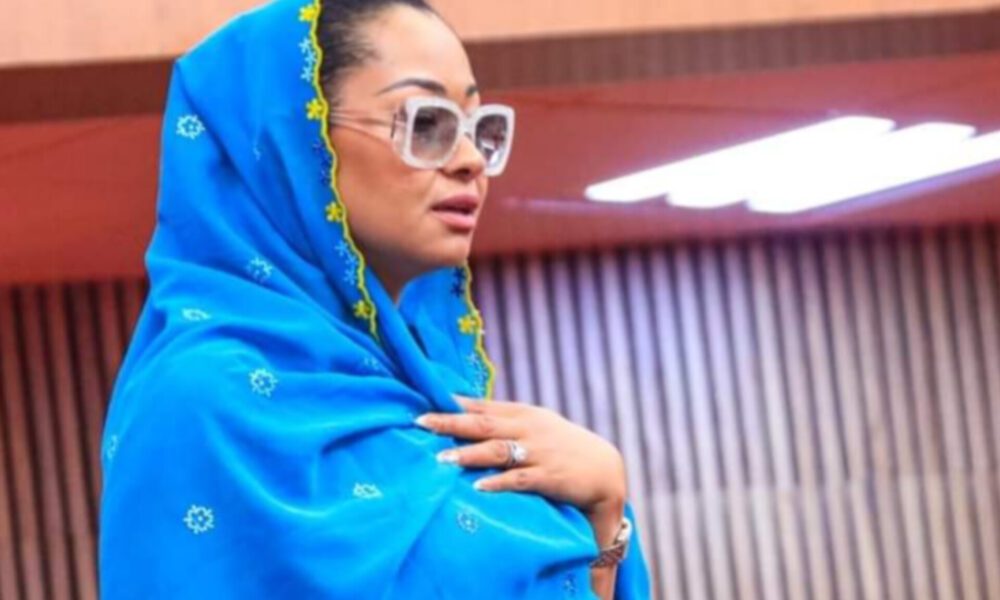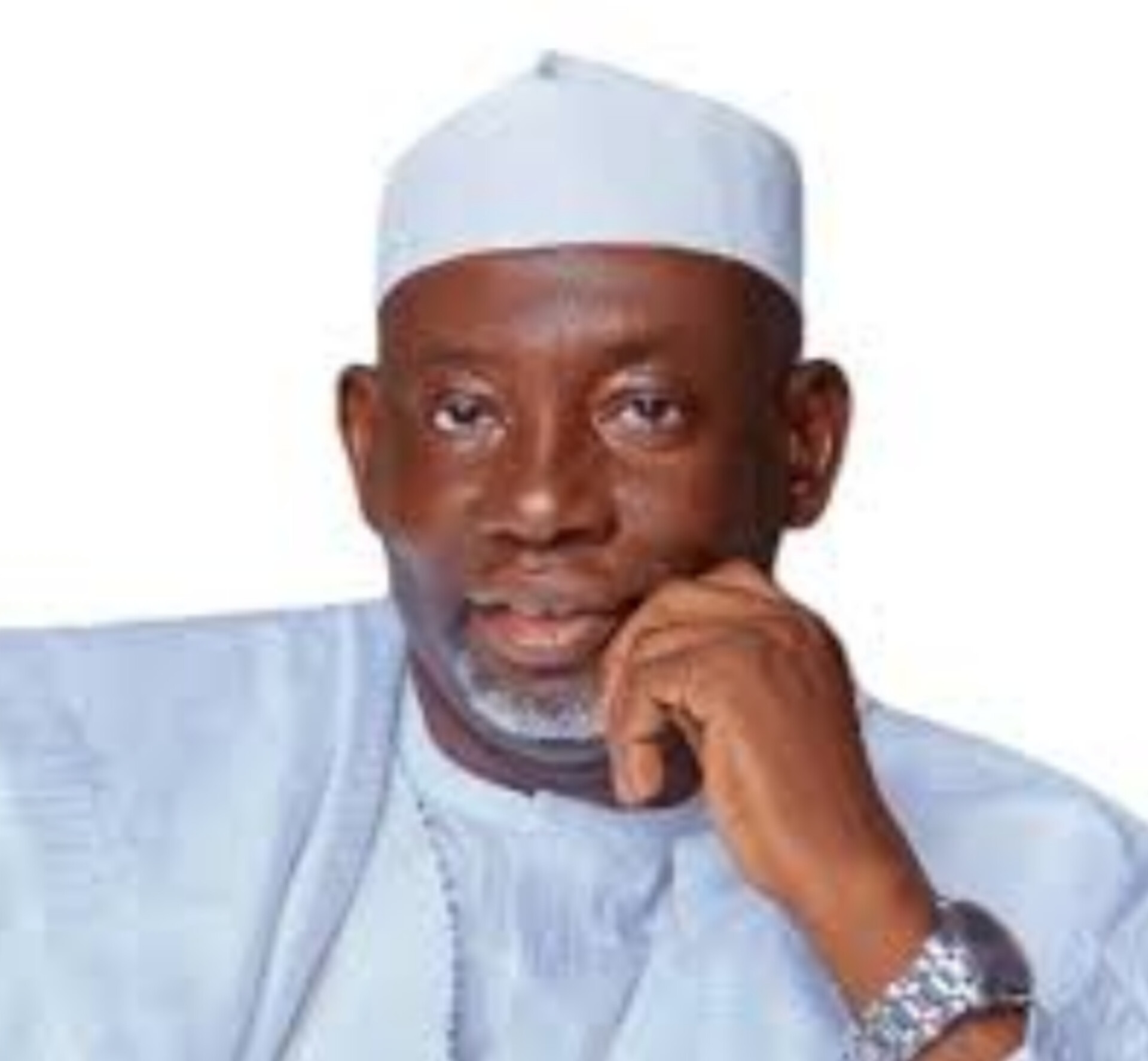By Tunde Olusunle
Followers of contemporary political developments are well aware of the lingering rift between the presidential candidate of the Peoples’ Democratic Party, (PDP), Atiku Abubakar and the “G-5” governors. In the aftermath of the PDP primary in May 2022 and the triumph of Atiku, the Rivers State governor, Nyesom Wike who came second in the contest rallied “troops” from the ranks of his colleagues, who share his disaffection. Sokoto State governor, Aminu Tambuwal a listed participant in the primary, stepped down at the venue of the primary and enjoined his supporters to support the candidature of Atiku.
Nigeria’s Vice President under the Olusegun Obasanjo regime, winner of the ticket, Atiku Abubakar, subsequently favoured Arthur Ifeanyi Okowa, governor of Delta State as his running mate, a consideration Wike believed he had the right of first refusal. Thus began a war of attrition which has persisted for eight months now and rattled the PDP to its roots. Wike will subsequently draw attention to the pre-primary speech of the National Chairman of the PDP, Iyorchia Ayu, wherein he promised to step down from office if a candidate from the North, won at that preliminary contest. Atiku from Adamawa, Ayu from Benue, and the Chairman of the Board of Trustees, (BOT), Walid Jibrin, from Nasarawa states, are all from Nigeria’s geographical North.

Backed by his colleague governors from four other states, Wike led the advocacy for the resignation of Ayu, to ensure North-South balancing, in a country extremely sensitive about issues of region, religion and ethnicity. Seyi Makinde, Samuel Ortom, Ifeanyi Ugwuanyi and Okezie Ikpeazu, governors of Oyo, Benue, Enugu and Abia, all lined up behind their aggrieved colleague. They constituted themselves into the famous G-5, which has since been expanded to the “Integrity Group,” following the joining of some other disaffected stakeholders of the party.
Meetings and more meetings have been held between Atiku and Wike, and the G-5 governors in Abuja, Port Harcourt and London, to broker rapprochement, all to no avail. In a symbolic move to assuage the North – South sensitivities, BOT Chairman, Jibrin, resigned his appointment and was promptly replaced by Adolphus Wabara, a former Senate President, who hails from Nigeria’s South East. But even this move has not placated the G-5/Integrity Group, who have remained resolute on the exit from office of Ayu, as minimum demand. No side has shifted grounds thus far, in what may yet become a reference point in the history of intra-party standoffs on the eve of transition polls.
Electioneering has since begun across the country as the nation gears up for presidential and national assembly positions, scheduled for Saturday February 25, 2023. Gubernatorial and state assembly polls are to hold a fortnight later on Saturday March 11, 2023. Atiku has grossed almost all 36 states of the country, with a grand finale slated for his home state, Adamawa on Thursday February 16, 2023. The Rivers State rally fixed for Saturday February 11, 2023, was outrightly cancelled by the Presidential Campaign Council, (PCC) for security reasons. PDP’s visitations to the various states have been relatively well received and impactful. There have been recent gun attacks on PDP leaders in the state, perceived to be opposed to Wike, notably Lee Maeba, a former Senator, and Abiye Sekibo, a minister under the Obasanjo government. These climaxed similar assaults even on opposing political parties in the state, culminating in the eventual abortion of the PDP presidential rally in Rivers.
Instructively, Wike’s ally in Benue State, Samuel Ortom, displayed utmost maturity and diplomacy in the management of the visit of the PDP PCC to the state, Tuesday February 6, 2023. He provided the venue of the rally, the “Aper Aku Stadium,” Makurdi, free to the PDP. Atiku’s wife, Titi, who with her entourage, came a day ahead of the presidential candidate to interact with Benue women, was accorded due hospitality by Government House, Makurdi protocol department. This included the provision of accommodation, ex gratis and shuttle vehicles for their local engagements.
True, Ortom had preplanned out-of-state capital duties. But he ensured that the State Working Committee of the PDP and all party organs beginning from the local government levels, participated in the successful rally. Gubernatorial flagbearer of the PDP for the state, Titus Tyoapine Uba and his running mate, John Ngbede, were also in full attendance. Ortom has never been pretentious about his preference for the candidacy of Peter Obi of the Labour Party, (LP). At the same time, the liberal and pragmatist he is, he has repeatedly made the point that he would not impose his preferences on his constituents. Ortom’s media adviser, Terver Akase, was to explain that his principal demonstrated statesmanship by encouraging his loyalists to participate in the event, because “he is not fighting a personal battle.” Ortom he noted, also “does not intend for the PDP in the state to fail.”
One week after the Makurdi rally, February 14, 2023, it was the turn of Enugu State to receive Atiku and the PDP presidential campaign train. Ugwuanyi, governor of the state, also a member of the aggrieved G-5, surprisingly showed up in person to receive Atiku on his arrival in the state. February 14 is globally commemorated as Valentine’s Day, a day proclaimed by the Pope of the Catholic Church, as a ritual of expressing love and admiration. Ugwuanyi may be assumed to have deployed the essence of the day to show some love. Beyond this, however, is the notable demonstration of courtesy and civility to the person of Nigeria’s first Vice President in the subsisting Fourth Republic, and presidential candidate of his party, by Ugwuanyi.
The outgoing Enugu governor is contesting for a seat in the 10th Assembly of the Senate. With the unpredictability and cinematic dynamics of Nigerian politics, Atiku, easily the most prepared and most preferred presidential candidate, may deservedly clinch it this time around. Ugwuanyi, if he wins the general elections, will be returning to the national parliament as a ranking legislator. He had previously served for three terms in the House of Representatives, precisely between 2003 and 2015, before his gubernatorial advent. Under an Atiku Abubakar PDP presidency, Ugwuanyi will be strategically positioned for topmost leadership slots in the Senate, allocated to his South East zone. He may be wisely and subtly sowing the seeds of plausible fence-mending in the algorithms and mathematical scheme of Nigeria’s immediate political future.
Atiku and the PDP PCC, had previously visited Oyo and Abia States, whose governors, Makinde and Ikpeazu, are part of the G-5. As in Benue and Enugu, there were no untoward incidents arising from visits to both states. The rallies were not only very well attended by leaders, stakeholders and loyalists of the PDP, they were also successful. Very Instructively, Atiku’s campaign rhetoric on the road, has been typically cultured, courteous and pointed. It has been devoid of aspersions, diversions and insinuations. He has restricted himself to the script, his blueprint as it were. Developed since his previous contests, it has been continually updated and fine tuned, to reflect contemporary sociopolitical realities and exigencies. His messaging everywhere has been targeted at issues at the socio-environmental core of his host states and geopolitical zones.
Atiku’s present manifesto is titled: My Covenant With Nigerians. The 2019 policy document was titled The Atiku Plan, the road map, Get Nigeria Working Again. The new document has a six-letter acronym: RESCUE. These are derived from, and encapsulate his presidential agenda, namely: Restoration; Economic turnaround; Security; Commitment to Rule of Law; Unity in Diversity, and Employment/Empowerment. Our nation has been evidently and multisectorally blighted under the rulership of the All Progressives Congress, (APC). Atiku believes and is resolutely committed to leading the emancipation of our country from the dunghill and valleys, along the pillars of his manifesto, once voted in as president on Saturday February 25, 2023.
Popular opinion largely favours the advent of an Atiku Abubakar presidential dispensation. His main opponent, Bola Tinubu a former governor of Lagos State, has continually betrayed signs of deep-seated medical challenges which are incompatible with national aspirations at a time like this. Traits of amnesia, dementia and Parkinsonism have been serially at play. During his more recent campaign outing in Kebbi State, the APC presidential candidate retroactively rescheduled the forthcoming elections to “January 25, 2023!” It was not a slip of tongue. It was the latest public demonstration of worrying previously noticed patterns.
Nigerians endured torrid and tortuous spells under the consistently ailing former President Umaru Yar’Adua, who eventually passed while on national service in May 2010. The incumbent, Buhari, has been marginally better with the president grossing almost one calendar year in foreign medical facilities since his inauguration on May 29, 2015. This is a fact compounded by his dull, dour performance in office. Added to Atiku’s compelling expertise, experience and pan-Nigerianism, is his unusually boisterous fitness folio for a 76 year old.
Tunde Olusunle, PhD, is Special Adviser on Media and Publicity to Atiku Abubakar, GCON, Presidential Candidate of the Peoples’ Democratic Party, (PDP)



